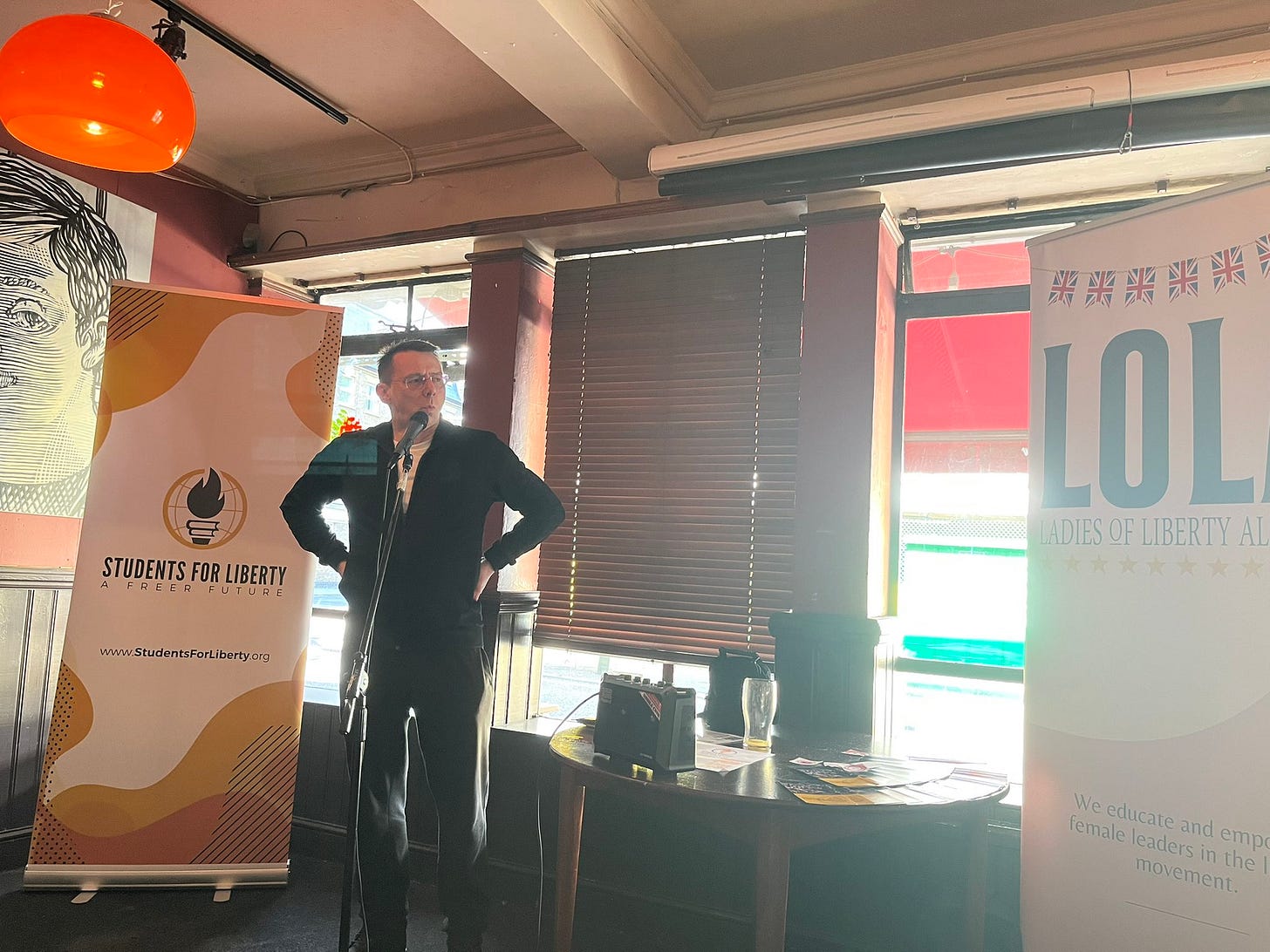
Yesterday I enjoyed the company of a good number of classical liberals, conservatives and libertarians at Student’s for Liberty’s ‘The Future of Liberty’ in London. Seven speeches were given; I watched six. Four of them explicitly dealt with strategy and I want to offer my thoughts on Mark Littlewood’s and
’s before making a few comments on the social aspects of the evening. Big thanks to fellow anarcho-capitalist – Joshua Cheshire – for arranging it.The Constitution Strategy
Following Steve Baker’s speech on Bitcoin, Mark Littlewood, Director of Popular Conservatism, gave a speech on the quangocracy. According to him, quangos, i.e., quasi autonomous government organisations, have grown immensely over the last thirty years; indeed, today there are 444 of them. Each has their own incentive to grow because that means higher pay and greater employment for them. A quango has never declared its job done and sacked everyone. Unfortunately, this growth in the quangocracy almost always involves taxing, regulating and coercing the people because the alternative of free markets would suggest you don’t actually need the quango at all.
Littlewood contends that when it comes to shaping society today it is not putting explicit arguments in political philosophy and economics among Hayek’s ‘second hand dealers in ideas’, or, pushing moral themes in cultural output which will change things in a free market direction most effectively. Rather, upstream of both economics and culture is the constitution. In particular it is the quangocracy’s power which needs to be removed back to Parliament which Littlewood sees as the imperative to restoring liberalism to the UK. And only after the powers of quangos have been returned to Parliament can liberals effectively argue for powers to be returned to the market.
Why? Parliament, unlike quangos, is democratically accountable, hence, classical liberals will have a greater chance of putting their policies into action via the ballot box, because, bad policies, i.e. state control policies, can be punished. Quangos can’t, or, will be to a lesser extent. Littlewood gave three examples. The Office for Budget Responsibility, Sentencing Guidelines Council and Natural England. Who is the head of the OBR? No one knows – yet this organisation has immense power in setting forecasts and offering advice which is seen to have great weight. The fact Liz Truss didn’t consult the OBR before her mini-budget is seen as heresy in political circles today. Another example given was the judges who have interpreted and enforced equal pay laws in Birmingham which has resulted in a bin strike leading to rubbish piling up all over the city.

Now I am sure Mark Littlewood has given much more thought to this topic than I have, after all, he was Director General of the IEA for almost fifteen years. Nevertheless, I am not too sure of the strategy of returning power from quangos to Parliament and only then to the market, rather than, straight from the quangos to the market (though Littlewood would admit that is the ideal). Why? Two reasons. First, when ever you are writing, broadcasting or speaking to people, the classical liberal needs to give arguments for two steps instead of one step; this dilutes the classical liberal message and means we spend less time on actually convincing people of our very controversial message, so, even if we potentially gain effectiveness in returning political power to Parliament, we definitely have less firepower in the short term on economic questions.
Also: If you’re a Nozickian libertarian, as Littlewood has professed to be in the past, you need to make an argument you don’t truly believe, namely, democracy is a good thing in itself. But of course, this isn’t your real reason for wanting it, rather, you simply want the quangos out the way because it’s supposedly easier to implement classical liberalism via Parliament than quangos. But you can’t say that because then people will just ask about your ultimate purpose which is abolishing quangos to return their power to markets. Moreover, libertarians will end up via this strategy in running up arguments for democracy which they will only have to try and knock down later and be accused of being hypocrites or liars in the process. No problem for classical liberals and conservatives, obviously.
Second, the quangocracy might actually be a retardant against further state control because politicians following the desires of the public in Parliament might be a lot worse. So, in replacing the quangocrats with politicians’, state control would get worse, not, contrary Littlewood, better. This would suggest that it is better to keep the quangocracy and argue for its powers to be returned to the market, while it retards Parliament instead of giving Parliament the power where it will go full steam ahead for state control while we classical liberals argue against it doing so, after having talked up how great Parliament is. Obviously, Littlewood is going to argue two things against this. One, quangos have their own inbuilt incentive for state control that Parliament doesn’t, and, he’s probably going to question quangos being retardants on state control relative to the public via politicians in Parliament.
This is a very complicated question, but I want to point to a few examples where quangos have done a better job than politicians in ensuring free markets, or, at least, more free markets than politicians would have us have. The Bank of England has been independent since 1997 and has not done the best job in the world, but between 1997 and 2019 the average rate of inflation was 2.1%, only 0.1% off its target. Before Bank of England independence, you had political business cycles, e.g., the Lawson Boom, which occurred when Chancellors deliberately reduced the rate of interest to below its free market level so they could get elected in a boom and see the bust only after their election. Do we really expect voters to be able to keep the Chancellor in check for monetary policy which the vast majority of them don’t understand, and, do a better job than the economists on the Monetary Policy Committee.
Look at the Low Pay Commission too, a body of trade unionists, businessmen and economists who have set the minimum wage since its 1999 introduction. They have made sensible increases to it since then, but it was when politicians got involved in 2016 under George Osbourne that the minimum wage started to balloon in size. As Len Shakleton has observed, the minimum wage is now increasingly being used as a political tool, while in the past when it was with solely a quango concern, it wasn’t. And, really, are we to expect a politician to ever lower the minimum wage? No. A quango which the politicians can blame for it might just do so though. Another example, would be the European Commission which would have stopped Jeremy Corbyn’s railway nationalisation plans.
As Bryan Caplan makes clear in The Myth of The Rational Voter, the people are very, very, poorly informed. The experts on the other hand are not. All else equal then, we should expect better decisions from the experts compared to the people (who are plagued by rational ignorance as per Anthony Downs). Of course, all else is not equal, but still. I wanted to add some further general evidence, but I can’t think of any relevant survey to cite on this topic. I should add, I don’t think Littlewood is definitely wrong, I’m just not sure that the quangocracy is worse than politicians in Parliament. Also, when it comes to housing policy local control is truly awful, while having national control, which is analogous to quango control here, is much better. The only thing which the political class are definitely worse on is culture war stuff, but this is a tiny part of state spending.

Compassion
The second speech on strategy came from the latter half of Reem Ibrahim’s speech. She correctly pointed out that it is entirely unacceptable for 10% of the working age population to be on out of work benefits and for any definition of disability to cover 25% of the UK’s adult population. However, I disagreed with the spin she put on how we classical liberals should handle this situation. According to her we should emphasise that ‘we are the really compassionate ones’ and ‘we should challenge the Left’s monopoly on compassion’. If we understand compassion as ‘sympathetic pity and concern for the sufferings or misfortunes of others’, in the vast majority of cases we shouldn’t be compassionate because people with “mental health problems” are to blame for their own situation, so, it’s not really a misfortune we should sympathise with.
The vast majority of these people don’t deserve compassion. Many of them are spongers and scoundrels. For evidence of that see my ConHome article. Sure: If you have your leg chopped off in a factory accident, I’m willing to be compassionate towards you, but not if you’re depressed, anxious or hyperactive in the way most people have these conditions. When classical liberals appear in media they should make clear in firm but not insulting tones that huge numbers of these people are exploiting the system; that should be the focus. Plus, we should always press that the redistributionism by which many people live at the expense of the productive class is immoral. Again, this should be the focus. Now Reem’s talk was mainly about the morality of capitalism and the central thrust of her argument was capitalism is ‘more moral’ because it comes about through voluntary exchange and not through force. 100% right. But when Reem came to her speech’s second part about the welfare class wasting away on the sofa, the focus was not, contrary what is suggested by her main thrust, on the immorality of the force behind the tax system which finances their sloth, rather, it was about the wellbeing of the welfare class.
Now, I happen to agree with Reem that the worst thing a person can do for their mental or physical health is waste away at home. But if the morality of capitalism is based on the absence of force, then the primary attack against the welfare system should be on the immorality of taxation, not wasted human potential; a secondary concern at best. Of course, the great problem with this focus for the Communication Officer of the IEA is it forces her in debates to say ‘taxation is theft’ which isn’t taken too seriously by most people and needs a lot of unpacking (though credit where it’s due, she does say it now and then). Nevertheless, when it comes to some questions of welfare, you can still favour lower spending while not saying taxation is theft, or, invoking the need for lower spending to get lower taxes and higher growth. This is when politicians come out with rubbish such as pensioners need the winter fuel allowance to heat their homes. They don’t. You can see Reem and mine approach to this topic at the links.
I would add a general culture where there is first a sceptical eye on welfare claimants is better for classical liberalism than one where it is first for sympathy. It is upon normal people, alongside opinion formers in newspapers and think tanks, to cultivate this. I’ve got two points to support this conclusion. First, the Victorian Age had a very sceptical eye as to welfare claimants, so much so they introduced the workhouse. They even had the idea of the deserving poor and underserving poor. Samuel Smiles’s Self-Help was a bestseller. If this culture was brought back, we’d probably have a much smaller state. Second, I would contend the namby pamby attitude we have taken to mental health in recent years has soften people overall which has been reflected in politicians being laxer in their provision of welfare. Only ten years ago, men who were depressed or upset were told to ‘man up’ and they were probably the better for it too. We need to divide the people between the productive class and the unproductive class and make the productive class have a qualified disdain for the unproductive class. And what I mean by the unproductive class is those who are able to work but refuse to do so, even if they give mental health excuses. Qualifications should only come after the main thrust of there is an unproductive class that must be booted out of their sloth.
Social Stuff
I am not a big fan of politicians. So, when I saw Andrew Rosindell MP come along to speak at a libertarian event I knew I was going to end up disagreeing with him (as I have done before). I’d missed his speech because he was a politician and was outside with two anarcho-capitalists saying I have no time for politicians who say they favour a smaller state but then will not vote for getting rid of the winter fuel allowance, i.e., less than 0.02% of state spending, especially when any Tory MP who voted for it would be able to get away with it because it was Labour’s policy. I explicitly said I suspect Mr Rosindell was probably in this group. Mr Rosindell then came and sat down next to us with his staffer. I thought to myself, ‘I don’t want to look or be cowardly in front of my fellow libertarians’, so, I decided I needed to confront him on it. I asked him whether he voted in favour of getting rid of the winter fuel allowance. He said ‘no’. He explained that pensioners needed the money but he’d be open to means testing it so the millionaires didn’t get it, though that would be too expensive. I explained that was exactly what the Labour proposal did with pension credit and the bottom quintile of pensioners spend 17% of their household budget on leisure.
Rosindell then replied with it wasn’t in the Labour manifesto, thus, given it was controversial it shouldn’t have gone through. I thought this was a cop out. To this I asked Rosindell whether or not he was an MP in 2010. ‘Yes’ he said. I then asked him whether or not he voted to increase VAT in the 2010 budget. This was explicitly against the Conservative’s manifesto. I think I got under his skin at this point because he said ‘don’t try and be clever with me’. I pressed him on how if he’s going to be against Labour for doing something unpopular and controversial just because it wasn’t in their manifesto, he’s got to be against himself for voting to increase VAT which was controversial, unpopular and explicitly against their manifesto. To this he spoke about how he couldn’t vote against the budget of his government; I said that must be because he thinks that is in the national interest, he didn’t disagree,
But should the national interest ultimately be what warranted his broken promise (it can’t just be because he’d lose the whip surely), why can’t the national interest warrant cutting winter fuel allowance, I affirmed. This debate had got a little bit heated half way though, so much so Ryan, another anarcho-capitalist in between us, asked if we wanted to sit next to each other – we both said no. So, it was a relief when Reem came along and broke the conversation and gave some special personal news.
It goes without saying that this event was overwhelmingly male. Usually, I don’t have a problem with this. But I would like to meet a girlfriend at a real-life event, and, it would be great if I could go to a libertarian event and find one. Even conservative events are much better than libertarian events it seems. I suppose this is a bit like me complaining that chilis are hot though; it’s almost in the very nature of libertarian events. Nevertheless, I has some good conservations with Chris Snowdon, Simon Clark and a number of people from the IEA, who I always enjoy conversing with, and, four anarcho-capitalists (one of whom actually managed to woo one of the few ladies there). And even if I criticise the thinking of Reem and Littlewood here, I don’t mean any of it as an attack on their character or good intentions. The latter was a great boss when I was at the IEA, even when I mucked up big time, and Reem is a good friend of mine who I enjoyed debating and shooting the breeze with at university, and, I still do when we get to meet at events like this.






I'm interested to see that spending 17% of ones budget on 'leisure' seems to strike you as profligate or unnecessary. That sounds Puritanical and illiberal to me - if less than a fifth of income is spent on the enjoyment of leisure, for what does the individual bother to work so many hours?
Perhaps it is difficult for you to imagine what life is like for people in situations of which you have no experience and, let's face it, you have enjoyed growing up in a wealthy and privileged environment.
For many, their work is necessary but unfulfilling - they do it because they cannot otherwise put food on the table. You have never been obliged to experience that situation, having your family's financial suport to fall back on if needed. Your lack of empathy with those who have mental health problems is, presumably, based on the behaviour of those who claim public benefits citing a feigned unfitness for work through depression or other intangible ailments.
Do you feel similar anger at those receiving ridiculously generous salaries from the public purse despite achieving nothing or worse?
It's good to see that the student generation still prefers physical meetings to digital conferencing, regardless of the green-ness of such activities.
Curios that the speakers were more interesting in using public opinion and parliament to advance libertarian ideals rather than technology, given that the biggest advances for libertarian causes have been from technical advances in cryptography and p2p networks.